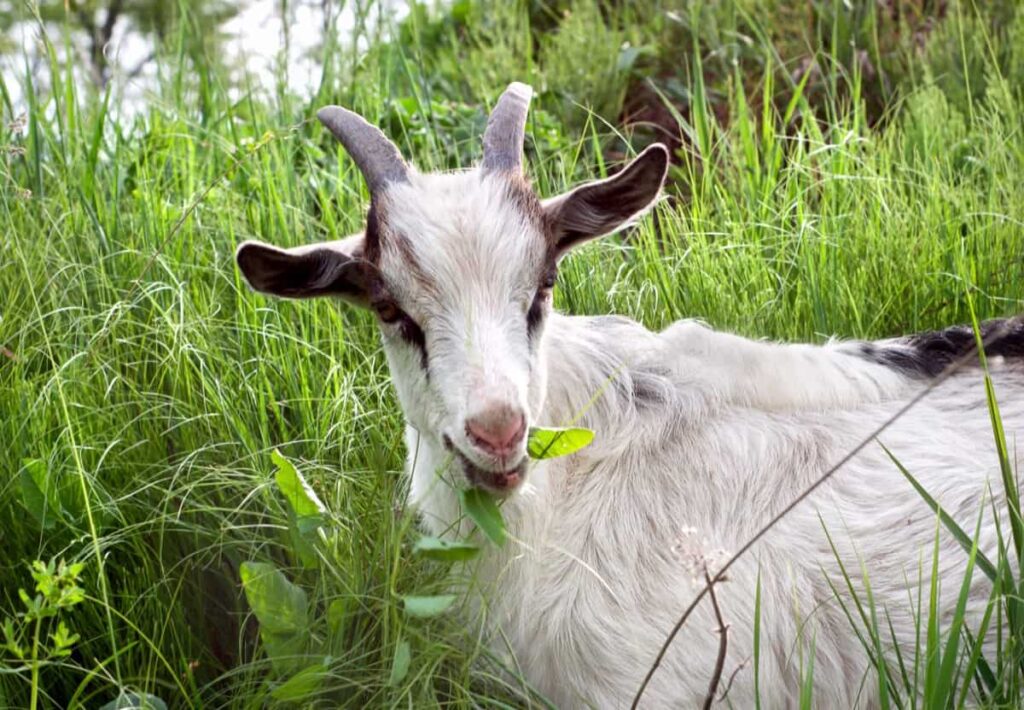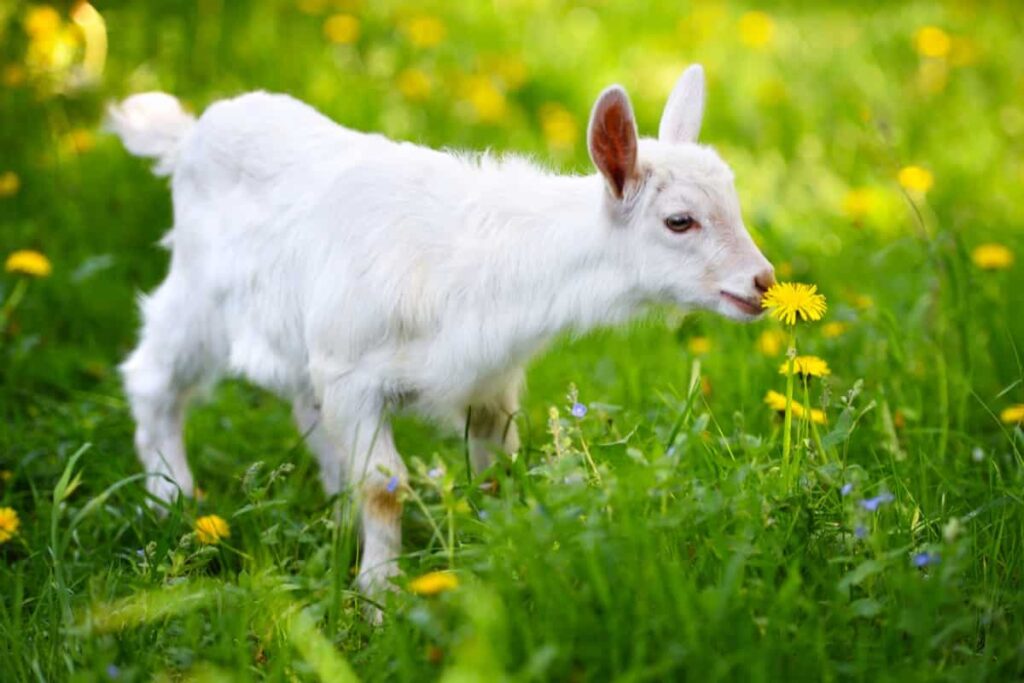Nigora goats have become popular among hobby farmers due to their versatility and charming personalities. They are also great for small-scale farming because they require less space than larger breeds. These small or medium-sized dual-purpose goats produce milk and fiber, making them valuable to any farm.

Nigora Goat Facts
Nigora Goat Characteristics
- One of the most striking characteristics of Nigora goats is their unique appearance. These goats are adorable and hardy with a compact, muscular body and a small to medium size. Their ears tend to be upright and pointed, adding to their distinctive look.
- Nigora goats come in various coat colors, including black, brown, gray, silver, and white. They have long hair that can be straight or curly, depending on the genetics of each goat. This makes them great for fiber production.
- Nigoras are known for their strong milk production capabilities. They produce rich milk with high butterfat content making it ideal for cheese making.
- Another characteristic is their friendly disposition towards humans, making them perfect pets and farm animals. These intelligent creatures love interacting with people, which makes them easy to train.
- Nigora goats typically live between 12-14 years when properly cared for by their owners. Thanks to careful breeding practices, these goats are relatively low-maintenance compared to other breeds, with fewer health issues overall.
- The combination of excellent fiber production capabilities and high-quality milk production capacity makes the Nigora breed worth considering for those interested in raising dual-purpose goats.
- Despite being small in stature (weighing between 60 to 100 pounds), they have powerful bodies with strong legs suitable for climbing and jumping around the farm.
Housing and Other Facilities for Your Nigora Goats
- A clean environment not only prevents illness but also keeps the goats happy. When building a shelter, ensure it’s sturdy enough to withstand harsh weather conditions. The shelter size should be proportional to the number of goats you have. Don’t overcrowd them, as this can lead to stress-related issues.
- The flooring of the shelter should be easy to clean and disinfect regularly. It’s important to monitor any signs of mold or dampness, which can affect their respiratory health.
- Access to fresh water is essential for any animal, so ensure your Nigora goats have a constant supply. Ensure that water troughs are cleaned daily and refilled with fresh water.
- Feeding areas should also be kept clean, as food debris attracts pests such as rodents that can transmit diseases to your Nigora goat herd.
- Maintaining proper housing and facilities will benefit you and your Nigora goats by reducing veterinary costs while ensuring the longevity of your animals’ lives.
- Raising Nigora goats requires proper housing, nutrition, and healthcare. It is important to provide them with adequate space to roam, access to clean water and quality feed, and regular veterinary check-ups.
- Nigora goats are adaptable to various climates and environments, meaning they can thrive in most regions across the United States. Their small size also requires less space than larger breeds, allowing farmers with limited land access to raise these versatile animals.
Steps to Start Nigora Goat Farming
- Ensure that your housing is appropriate for Nigora goats. They require ample space to move around and good ventilation to prevent respiratory diseases. Also, make sure their shelter is clean with fresh bedding.
- Next, provide your Nigoras with high-quality hay and grain formulated specifically for their nutritional needs. Supplement their diet with vegetables and minerals like calcium and phosphorus.
- Regular grooming keeps your Nigoras neat while preventing skin problems such as lice or mites. Their fiber also needs frequent shearing every 6 months to maintain quality.
- It’s important to have an experienced veterinarian specializing in goat care for routine check-ups or emergencies. Vaccinations are also necessary against common illnesses like tetanus.
- Socialize your herd by allowing them time to play together outside their pens daily or gradually introducing new members over some weeks.
In case you missed it: Mehsana Goat Farming: A Comprehensive Information Guide

Feeding and Nutrition for Nigora Goats
- Feeding and nutrition are crucial aspects of raising Nigora goats. These small, dual-purpose goats require a balanced diet that meets their nutritional needs for growth, milk production, and fiber development.
- Good quality hay is the mainstay of your goat’s diet. Legume-based hays such as clover or alfalfa are ideal as they provide high levels of protein and calcium, which Nigora goats need in their diets. A constant supply of fresh water must always be available to them.
- Aside from hay, you can supplement your goat’s diet with commercial goat feed mixes containing essential minerals like copper, zinc, iron, selenium, and vitamins. Grains like wheat bran, barley, or oats can also be added to their meals but only in moderate amounts.
- It’s important not to overfeed your Nigora goats as this may lead to obesity, increasing the risk for metabolic diseases such as ketosis or fatty liver disease. Also, avoid feeding them toxic foods, such as chocolate or onions.
- A well-balanced diet is vital in keeping your Nigora goats healthy so they can produce high-quality milk and fiber while living long lives on your farm.
Health Care Requirements for Nigora Goats
- Nigora goats are known for their hardiness and adaptability to various conditions but still require proper health and care management. Maintaining their overall health is one of the most important aspects of caring for Nigora goats.
- To keep your Nigora goat healthy, you should ensure it receives regular check-ups from a veterinarian. These check-ups will help detect potential problems early on, allowing you to address them before they become more serious.
- Another essential aspect of keeping your Nigora goat healthy is a balanced diet. The ideal diet for this breed consists of hay or pasture grass, along with grain or other supplements as needed. Make sure that your goats have access to clean water at all times.
- You should also maintain good hygiene practices in caring for your Nigora goats. This includes keeping their living quarters clean and dry, regularly trimming hooves when necessary, and grooming them appropriately to keep them free from parasites.
- It’s crucial to be aware of common diseases that may affect this breed, such as worm infestation or respiratory infections, so you can take preventative measures against disease outbreaks within the herd.
In case you missed it: Murcia Granada Goat Breed: A Comprehensive Information Guide

Conclusion
These American bred goats produce milk and provide high-quality fiber, making them valuable additions to any homestead. Nigoras are known for their docile temperament, which makes them easy to handle, even for first-time goat owners. This gentle disposition also makes them great companions for families with children or other animals.
- Types of Grass Growing for Goat Farm
- How to Train Goats for Milking: A Beginners Guide
- Goat Milking Practices and Equipment: A Beginner’s Guide
- Goat Farming for Fiber: Producing Mohair and Cashmere
- Maximizing Goat Milk Production: Tips for Dairy Goat Farmers
- Goat Farming as a Family Business: Strategies for Success
- Profitable Kenya Goat Breeds for Commercial Dairy and Meat Business
- Unlock the Secrets of Oberhasli Goat: Discover Raising and Management Practices
- Ultimate Guide to Myotonic Goats: Explore Profile to Raising